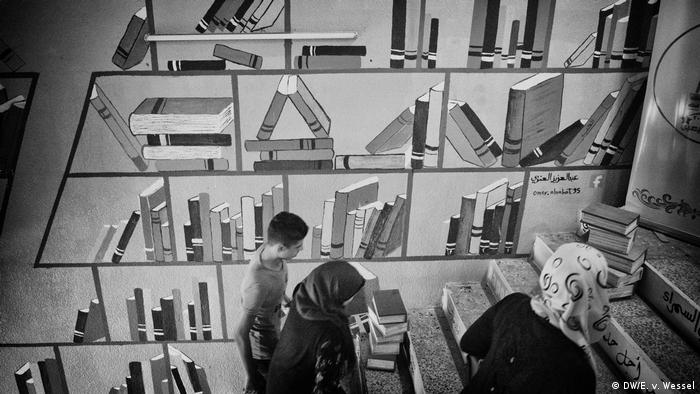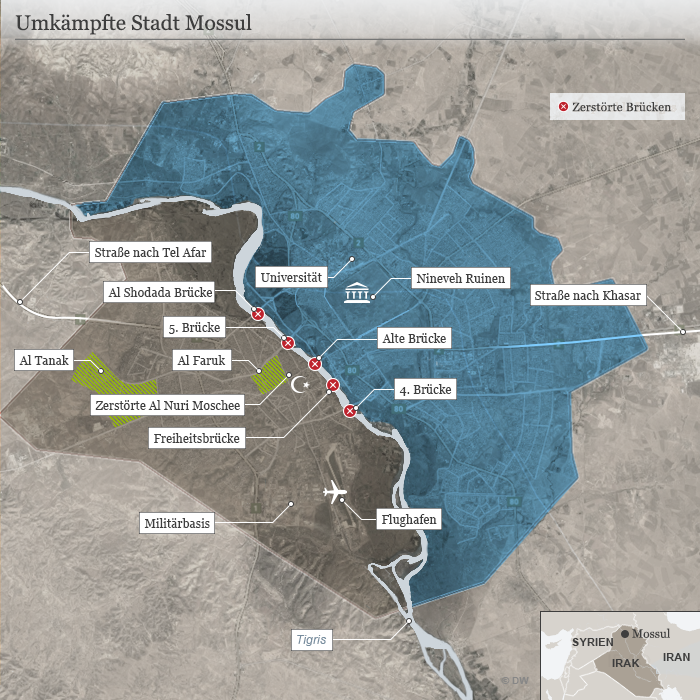Music, books, and exhibitions: After the liberation from the “Islamic state”, returns the culture in the Iraqi city of Mosul. Will stop the new-found freedom? Judit Neurink reports from Mosul.

There is a Park in Mosul. Here, the so-called IS once formed child soldiers. Now, thousands of people have gathered for a book festival with music, Theater and tables full of books were collected for the residents of the city.
The culture is back in the second largest city of Iraq. And the “I’m Iraqi, I read”Festival is just one of many cultural events. The Motto of the festival is modelled on a traditional Arabic saying: “the Egyptians write, Lebanese publish, Iraqis read.”
“We don’t appreciate things until we lose them,” says Ali al-Barudi. He is senior lecturer in English at the University of Mosul and unofficial chronicler of the town. He crosses the city on his wheel, and photographed the damage and the reconstruction. “The liberation of East of Mosul by Daesh was a second birthday for me.”
Art and culture have the IS, or Daesh, the Arabic acronym – suffered greatly. Statues of poets and writers were torn down, works of art and musical instruments destroyed, and the University library on fire, many of the valuable volumes are gone forever. Books were banned, non-religious art was taboo, musicians and other artists.
Art and culture banished a long time
The suppression began shortly after the US invasion in 2003, when radical Muslims in the city to the ground won. “The is is like a Ghost – you don’t see him, but he is there to collect for the time when he returns, secretly, information about us,” says al-Barudi of the German wave. “He has ruled since 2005 in Secret, and publicly since 2014. It is not easy to extinguish. Under Daesh, I died a thousand times a day. Now Mosul has to get rid of first fear.”

His father warns him to be more careful, but for the young photographers, it is a Mission to document the developments in the city.
He compares the Situation with the first few years after 2003, when Iraqis were celebrating the change and the freedom they had waited so long – until the radical Muslims on the image area appeared to fight the Americans, and the positive developments pötzliches the end. But this Time, many in Mosul are of the opinion that the change process needs to be continued.
“Better than before IS“
Marwan Tariq teaches at the University of Mosul. He also finds that progress has been made. “The Situation now after Daesh is already better than it was before your arrival.” Tariq was one of the first who entered the heavily bombed the Campus of the University again, after the IS had been chased away in the past year. The damage in his Institute was terribly. “Everything that had a connection to art, was broken. Pianos, Uds (Arab Lutes), guitars, paintings and sculptures,” he says.

During the battle of Mosul, on 21. June 2017, the al-Nuri was destroyed mosque in a largely
Together with his students, he started the still standing building clean up – without the support of the government. For everyone who stayed during the occupation is still, the collaboration with the IS suspicious. At the same time, people still fear the IS-members who have disappeared in the underground. “That’s why you see in the art is hardly something that has to do with the occupation,” says Tariq.
To help the people of the city, with the experiences under the IS rule is clear: the art scene seems to play no role. This is about in the Kurdish Region in Iraq. There is a jesidischer artist has painted pictures in which he represents the fate of his fellow human beings.
The artists in Mosul have found a different way to celebrate their newfound freedom. In may, 2017, on the other side of the Tigris, which divides the city, was fought, al-Barudi and Tariq co-organized an art exhibition in East Mosul. Images and paintings were exhibited at the soot-blackened Remains of a University building to the sounds of the long-forbidden music.
In addition, there was a campaign by students, faculty, and volunteers, the books were rescued, had survived the fire in the University library.
Watch the Video 02:09 Now live 02:09 Min. 
Campaign “Mossuls Eye”
Send Facebook Twitter google+ Tumblr VZ Mr. Wong Xing Newsvine Digg
Permalink https://p.dw.com/p/30zOE
Voluntary books to rescue from Mossuls Central library
The art returns to Mosul
After the fire in the library of the al-Barudi, together with students and other volunteers, about 6,000 books from the ash mountains. The historian Omar Mohammed, internationally known as the Blogger “Mosul Eye”, launched a call, and thousands of books from abroad were sent to replace the lost.
The music is also returned to Mosul. During the art exhibition, you hear the sounds of the Ud, a Bassist playing at the destroyed sites, like the al-Nuri mosque with its famous Hadba minaret. Here IS-leader Abu Bakr al-Baghdadi is not only the “Caliphate proclaimed,” the terrorist organization destroyed the mosque, shortly before she was expelled from Mosul.
Also, in the first visible Mossuls, led by Fahad Sabah and Harith Yassin, plays the music. You’ve recently opened and want to not only offer Young, Old, man and woman a quiet place to read and Work with a Cup of coffee or tea, but also for concerts and public literature, discussions host.

Fahad Sabah, and Harith Yassin: The people of Mosul should be able to enjoy fear-free art and culture
Cultural Comeback in small steps
In the cafe, where clean, stocked bookshelves and portraits of writers, musicians, and artists to determine the atmosphere, confirmed Sabah, that the culture is returned to Mosul. “Even before Daesh is a public discourse out of fear of the extremists and their threats was impossible. Now the society is much more open. Our Café is just one example,” he says. “Look at what we do and who comes in here. We operate the first public space in which men and women feel at home.”
He told of the long period of segregation in the city. “Until the 1980s, cinemas were still mixed. But then the society, more radicalized, and the culture fell into a downward spiral.”
Sabah wants to help to avoid the mistakes that were made after 2003, and instead, the newfound openness of the city to build on. However, it is estimated that at least a fifth of the inhabitants Mossuls of the IS agree with the ideology – even their brutal implementation. “Therefore, we need to understand our problems and opportunities. This is the first step in the direction of a solution. It is not easy, therefore, we will have to work hard.”